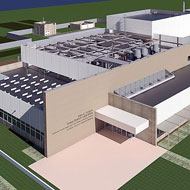
California lab will provide rapid disease detection and response
The University of California Davis (UC Davis) School of Veterinary Medicine has opened a new $49.4 million laboratory to aid the protection of animal health, public health and the food supply.
When fully equipped, the 29,000 square foot lab will provide rapid detection and response to routine illnesses and catastrophic, emerging animal diseases. Testing for livestock, poultry and horses will be available.
Karen Ross, secretary of the state Department of Food and Agriculture, said: "As we dedicate this new laboratory in Tulare we are remanded that skilled scientists with state-of-the-art diagnostic equipment are truly at the front line, working with farmers, ranchers and veterinarians to protect the safety and security of our nation's food supply."
The Alex A Ardans Tulare Branch Laboratory sits adjacent to the UC Davis Veterinary Medicine Teaching and Research Center. It was named in honour of Professor Emeritus Alex A Ardans, who founded the California Animal Health and Food Safety Laboratory System, which is run by the vet school. Dr Ardans also led the statewide diagnostic service for 21 years.
"It is quite fitting as we celebrate the construction of the new Tulare lab that we also honour Dr Ardans, whose vision and many years of wise leadership enabled the statewide laboratory system to become a national leader in detecting and preventing livestock and poultry diseases," said Michael Lairmore, dean of the UC Davis vet school.
The Tulare lab is one of four existing labs - the UC Davis central diagnostic lab, and branch labs in San Bernardino and Turlock.
In 2015 the statewide laboratory system carried out more than half a million diagnostic tests and has a long history of success. In 2002 it diagnosed exotic Newcastle disease in backyard chickens, leading to a $168 million state federal eradication effort. In 2012, it detected California's first case of atypical bovine spongiform encephalopathy, and last year played a major role in limiting the spread of avian influenza.
Image courtesy of UC Davis



 The Veterinary Medicines Directorate (VMD) is inviting applications from veterinary students to attend a one-week extramural studies (EMS) placement in July 2026.
The Veterinary Medicines Directorate (VMD) is inviting applications from veterinary students to attend a one-week extramural studies (EMS) placement in July 2026.